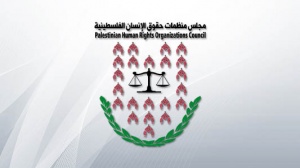 In light of the resignation of the United Nations Special Rapporteur on the situation of human rights in the occupied Palestinian territory - Makarim Wibisono – on account of his “efforts to help improve the lives of Palestinian victims of violations under the Israeli occupation [being] frustrated every step of the way” by the Israeli occupying power, the Palestinian Human Rights Organizations Council (PHROC) takes this opportunity to thank Mr Wibisono for his valuable contribution to the promotion of human rights inside the occupied Palestinian territory (oPt).
In light of the resignation of the United Nations Special Rapporteur on the situation of human rights in the occupied Palestinian territory - Makarim Wibisono – on account of his “efforts to help improve the lives of Palestinian victims of violations under the Israeli occupation [being] frustrated every step of the way” by the Israeli occupying power, the Palestinian Human Rights Organizations Council (PHROC) takes this opportunity to thank Mr Wibisono for his valuable contribution to the promotion of human rights inside the occupied Palestinian territory (oPt).
This contribution includes - inter alia – Mr Wibisono’s drawing of attention to the brutal impact of Israel’s 2014 military assault on the Gaza Strip upon the resident Palestinian civilian population, and particularly the devastating consequences of this assault for Palestinian children; the identification of Israel’s closure of the Gaza Strip as constituting collective punishment of the civilian population; his noting of the causal link between official policies of the Israeli government and abhorrent settler attacks on Palestinians, and his highlighting of the parallel legal systems applied by Israel to Jewish Israeli settlers and Palestinians inside the oPt, with the implementation of such legal parallels being entirely consistent with recognized definitions of apartheid.
The role of the Special Rapporteur on the situation of human rights in the occupied Palestinian territory is of great importance. That this mandate exists is recognition of the special responsibility of the UN towards the Palestinian cause, the unique nature of a military occupation rapidly approaching its 50th year, and of the extreme, resulting vulnerability of the rights of the occupied Palestinian populace. It is a mandate which provides a vital conduit through which awareness of the human rights situation in the occupied Palestinian territory can be raised. This subsequently serves to promote transparency, the protection of at-risk communities and accountability for perpetrators of rights abuses. Despite the extreme importance of the mandate, however, Israel has intentionally and relentlessly undermined the ability of the mandate to perform its essential function.
Since 2008, Israel has prevented the mandate from accessing the oPt. This refusal is far from an isolated incident, and represents merely the latest event in what has become a pattern of Israeli non-compliance with UN mechanisms. In January last year, Israel refused to grant a visa for former UN Special Rapporteur on Violence against Women, its Causes and Consequences, Ms. Rashida Manjoo, who had been invited by the Palestinian Authority to "obtain first-hand understanding of issues related to violence against women". The Israeli occupying power has further refused to cooperate with independent UN-established investigations into grave human rights abuses within the oPt. Prominent examples of this non-compliance include the denial of entry to the West Bank in 2009 of the United Nations Fact Finding Mission on the Gaza Conflict following Operation Cast Lead, the denial of entry to all areas of the oPt in 2012 of the UN Fact-finding Mission on Israeli Settlements and the denial of entry to all areas of Israel and the oPt of the United Nations Independent Commission on Inquiry on Gaza 2014.
Mr Wibisono’s resignation is a damning indictment of Israel’s human rights credibility, and highlights a frustrating and dangerous pattern adopted by Israel towards the undermining and weakening of international human rights and justice mechanisms. The fact that such obstructive behavior goes largely unchallenged gives the impression that Israel is being given preferential treatment. Accordingly, third party states, regional bodies and organs of the United Nations must no longer accept this Israeli policy, demonstrably designed to frustrate external investigative processes and to prevent scrutiny of the catalogue of rights abuses, war crimes and crimes against humanity which originate from Israel’s ongoing occupation.
Addressing this completely unacceptable and unsustainable state of affairs therefore represents a matter of great urgency if the mandate - and UN investigatory processes generally - are to retain legitimacy and the ability to deliver tangible change. Establishing access to the oPt for independent, investigative bodies can only be realized through the application of concerted pressure by the international community through all available channels, including the implementation of sanctions, until such a time as Israeli actions are shown to adhere to international law.
Palestinian Human Rights Organizations Council



 In light of the resignation of the United Nations Special Rapporteur on the situation of human rights in the occupied Palestinian territory - Makarim Wibisono – on account of his “efforts to help improve the lives of Palestinian victims of violations under the Israeli occupation [being] frustrated every step of the way” by the Israeli occupying power, the Palestinian Human Rights Organizations Council (PHROC) takes this opportunity to thank Mr Wibisono for his valuable contribution to the promotion of human rights inside the occupied Palestinian territory (oPt).
In light of the resignation of the United Nations Special Rapporteur on the situation of human rights in the occupied Palestinian territory - Makarim Wibisono – on account of his “efforts to help improve the lives of Palestinian victims of violations under the Israeli occupation [being] frustrated every step of the way” by the Israeli occupying power, the Palestinian Human Rights Organizations Council (PHROC) takes this opportunity to thank Mr Wibisono for his valuable contribution to the promotion of human rights inside the occupied Palestinian territory (oPt).










